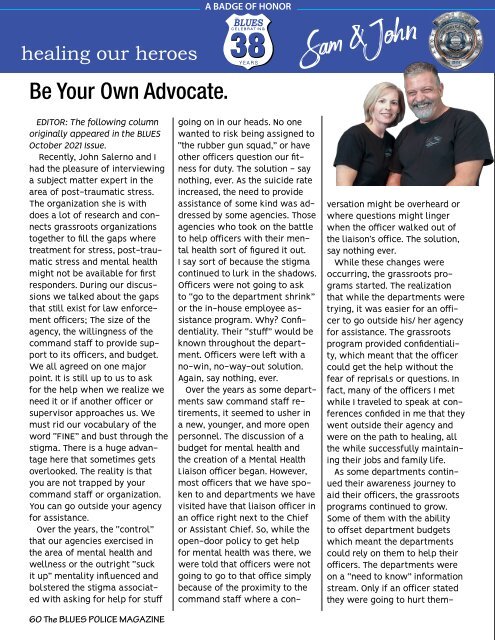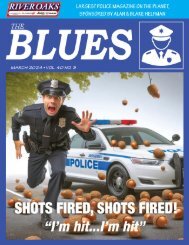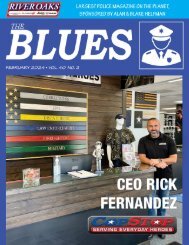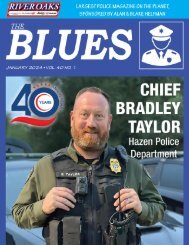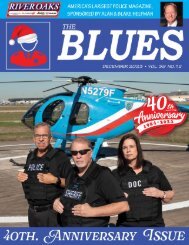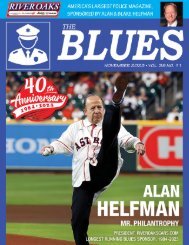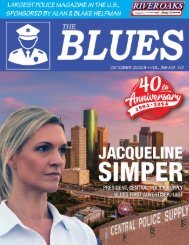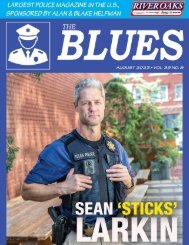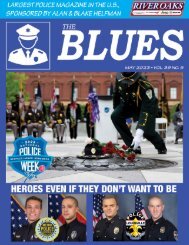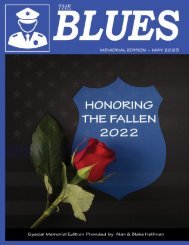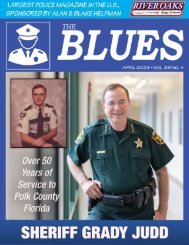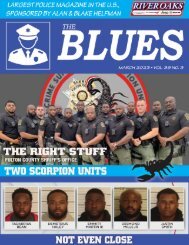Jan 2022. Blues Vol 38 No. 1
Jan 2022. Blues Vol 38 No. 1 FEATURE STORIES • New Year Resolutions for 2022 • Remembering Those We’ve Lost to COVID • Remembering Those We’ve Lost to LOD Deaths • Feature Story: They Didn’t Make it • Special Memorial Insert - Officers we Lost in 2021 DEPARTMENTS • Publisher’s Thoughts • Editor’s Thoughts • Your Thoughts • News Around the US • War Stories • Aftermath • Open Road - NYPD Orders Mustang E’s • Healing Our Heroes • Daryl’s Deliberations • HPOU - From the President, Douglas Griffith • Light Bulb Award • Running 4 Heroes • Blue Mental Health with Tina Jaeckle • Off Duty with Rusty Barron • Ads Back in the Day • Parting Shots • Now Hiring - L.E.O. Positions Open in Texas • Back Page - Meet the Commish
Jan 2022. Blues Vol 38 No. 1
FEATURE STORIES
• New Year Resolutions for 2022
• Remembering Those We’ve Lost to COVID
• Remembering Those We’ve Lost to LOD Deaths
• Feature Story: They Didn’t Make it
• Special Memorial Insert - Officers we Lost in 2021
DEPARTMENTS
• Publisher’s Thoughts
• Editor’s Thoughts
• Your Thoughts
• News Around the US
• War Stories
• Aftermath
• Open Road - NYPD Orders Mustang E’s
• Healing Our Heroes
• Daryl’s Deliberations
• HPOU - From the President, Douglas Griffith
• Light Bulb Award
• Running 4 Heroes
• Blue Mental Health with Tina Jaeckle
• Off Duty with Rusty Barron
• Ads Back in the Day
• Parting Shots
• Now Hiring - L.E.O. Positions Open in Texas
• Back Page - Meet the Commish
Create successful ePaper yourself
Turn your PDF publications into a flip-book with our unique Google optimized e-Paper software.
A BADGE OF HONOR<br />
healing our heroes<br />
Be Your Own Advocate.<br />
EDITOR: The following column<br />
originally appeared in the BLUES<br />
October 2021 Issue.<br />
Recently, John Salerno and I<br />
had the pleasure of interviewing<br />
a subject matter expert in the<br />
area of post-traumatic stress.<br />
The organization she is with<br />
does a lot of research and connects<br />
grassroots organizations<br />
together to fill the gaps where<br />
treatment for stress, post-traumatic<br />
stress and mental health<br />
might not be available for first<br />
responders. During our discussions<br />
we talked about the gaps<br />
that still exist for law enforcement<br />
officers; The size of the<br />
agency, the willingness of the<br />
command staff to provide support<br />
to its officers, and budget.<br />
We all agreed on one major<br />
point. It is still up to us to ask<br />
for the help when we realize we<br />
need it or if another officer or<br />
supervisor approaches us. We<br />
must rid our vocabulary of the<br />
word “FINE” and bust through the<br />
stigma. There is a huge advantage<br />
here that sometimes gets<br />
overlooked. The reality is that<br />
you are not trapped by your<br />
command staff or organization.<br />
You can go outside your agency<br />
for assistance.<br />
Over the years, the “control”<br />
that our agencies exercised in<br />
the area of mental health and<br />
wellness or the outright “suck<br />
it up” mentality influenced and<br />
bolstered the stigma associated<br />
with asking for help for stuff<br />
going on in our heads. <strong>No</strong> one<br />
wanted to risk being assigned to<br />
“the rubber gun squad,” or have<br />
other officers question our fitness<br />
for duty. The solution - say<br />
nothing, ever. As the suicide rate<br />
increased, the need to provide<br />
assistance of some kind was addressed<br />
by some agencies. Those<br />
agencies who took on the battle<br />
to help officers with their mental<br />
health sort of figured it out.<br />
I say sort of because the stigma<br />
continued to lurk in the shadows.<br />
Officers were not going to ask<br />
to “go to the department shrink”<br />
or the in-house employee assistance<br />
program. Why? Confidentiality.<br />
Their “stuff” would be<br />
known throughout the department.<br />
Officers were left with a<br />
no-win, no-way-out solution.<br />
Again, say nothing, ever.<br />
Over the years as some departments<br />
saw command staff retirements,<br />
it seemed to usher in<br />
a new, younger, and more open<br />
personnel. The discussion of a<br />
budget for mental health and<br />
the creation of a Mental Health<br />
Liaison officer began. However,<br />
most officers that we have spoken<br />
to and departments we have<br />
visited have that liaison officer in<br />
an office right next to the Chief<br />
or Assistant Chief. So, while the<br />
open-door policy to get help<br />
for mental health was there, we<br />
were told that officers were not<br />
going to go to that office simply<br />
because of the proximity to the<br />
command staff where a conversation<br />
might be overheard or<br />
where questions might linger<br />
when the officer walked out of<br />
the liaison’s office. The solution,<br />
say nothing ever.<br />
While these changes were<br />
occurring, the grassroots programs<br />
started. The realization<br />
that while the departments were<br />
trying, it was easier for an officer<br />
to go outside his/ her agency<br />
for assistance. The grassroots<br />
program provided confidentiality,<br />
which meant that the officer<br />
could get the help without the<br />
fear of reprisals or questions. In<br />
fact, many of the officers I met<br />
while I traveled to speak at conferences<br />
confided in me that they<br />
went outside their agency and<br />
were on the path to healing, all<br />
the while successfully maintaining<br />
their jobs and family life.<br />
As some departments continued<br />
their awareness journey to<br />
aid their officers, the grassroots<br />
programs continued to grow.<br />
Some of them with the ability<br />
to offset department budgets<br />
which meant the departments<br />
could rely on them to help their<br />
officers. The departments were<br />
on a “need to know” information<br />
stream. Only if an officer stated<br />
they were going to hurt themselves<br />
or someone else was the<br />
department informed. Confidentiality,<br />
anonymity, and a comfort<br />
level were provided to the<br />
officer. As a result, we started to<br />
see dents in the stigma.<br />
When departments created<br />
Peer Support programs, those<br />
that were successful saw a<br />
decrease in suicides and an<br />
increase in positive outcomes<br />
for the officers. Supported from<br />
the top, with an emphasis on<br />
ZERO reprisals by the department,<br />
officers could get the help<br />
they asked for. The result. The<br />
dents in the stigma grew larger.<br />
As the command staff’s awareness<br />
grew about the positive<br />
outcomes for their officers, the<br />
indicators showed that the department<br />
functioned better. And<br />
a good functioning department<br />
means a healthy department.<br />
Are these “successful” departments<br />
the outliers? Maybe.<br />
The hope is that the grassroots<br />
programs and the departments<br />
work together to continue to put<br />
dents in the stigma, ultimately<br />
smashing it completely one day.<br />
What we still do know for sure<br />
The BLUES<br />
Delivered to Your<br />
Email Every Month<br />
FREE SUBSCRIPTION<br />
CLICK HERE<br />
is you are your best advocate. As<br />
hard as it may be, you must be<br />
the one to reach out and ask for<br />
help. The grassroots programs<br />
like A Badge of Honor are here<br />
to assist at every level. We allow<br />
you to be in control of your<br />
mental health journey, leaving<br />
behind the one thing that still<br />
hampers some requests from<br />
within the department…STIGMA.<br />
So, find the courage to be your<br />
own advocate. And remember,<br />
your journey may help to save<br />
another brother, sister, and/or<br />
BLUE family. You are not alone.<br />
Samantha Horwitz is a regular<br />
contributor to The <strong>Blues</strong> Police<br />
Magazine. She is a 9/11 first<br />
responder, former United States<br />
Secret Service Agent, speaker,<br />
and author. She and her business<br />
partner, ret. NYPD detective John<br />
Salerno created A Badge of Honor,<br />
a 501(c)(3), post-traumatic stress<br />
and suicide prevention program<br />
for first responders. John and<br />
Sam host MAD (Making a Difference)<br />
Radio each Wednesday 7pm<br />
central live on FB @Makingadifferencetx.<br />
For more about Sam and<br />
the wellness and resiliency workshops<br />
for first responders, visit<br />
ABadgeofHonor.com.<br />
CLICK OR SCAN HERE<br />
60 The BLUES POLICE MAGAZINE The BLUES POLICE MAGAZINE 61


